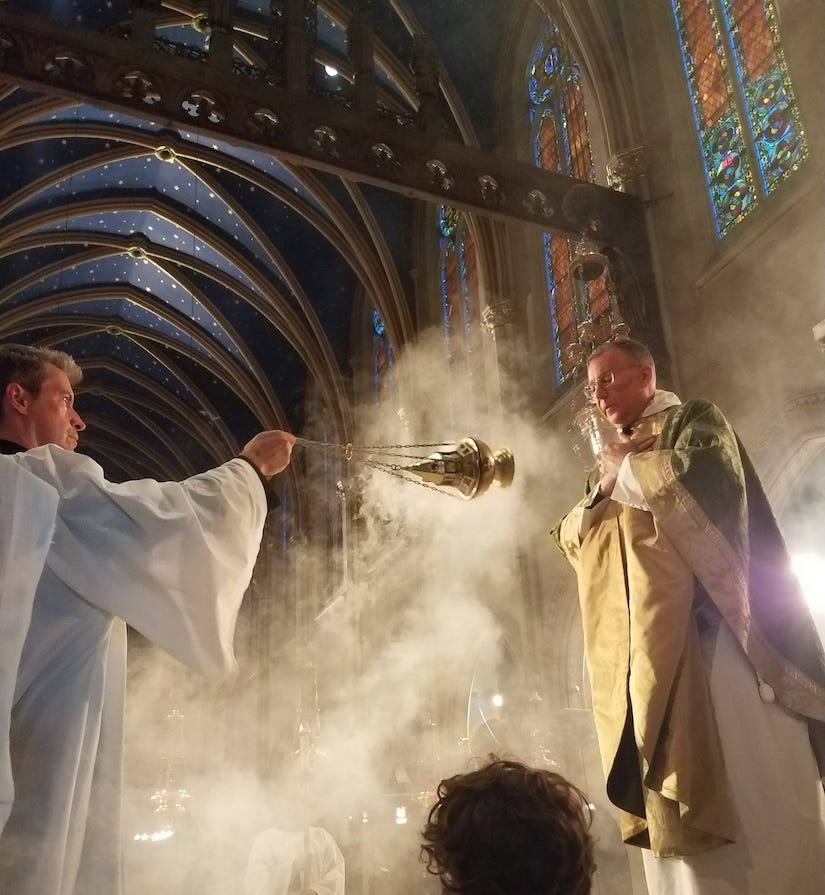Picture - From the parish website
This article is from Father Sammy Wood, priest-in-charge, St. Mary the Virgin, Times Square. It was published earlier today in the Angelus. “Saint Mary’s is a vibrant Anglo-Catholic witness in the heart of New York City. With our identity in Christ and a preference for the poor, we are an inclusive, diverse community called to love God and each other for the life of the world.” (parish website)
There are a few hinge events throughout my personal history to which I can trace significant life-change.
Becoming a Christian in college.
Marrying Renee.
The births of my children.
Discovering the Episcopal Church, Anglo-Catholicism, and beginning to follow a three-fold rule for the spiritual life: Praying the Daily Office, Eucharist, and personal devotion.
Without those events, I’m not who I am today.
And the same holds true for the hours of intimate conversation I enjoyed with my first spiritual director many years ago.
If you aren’t familiar with spiritual direction, you can find almost as many definitions for the practice as you can find practitioners. To some, it is more art than science, so it resists final definition. Margaret Gunther famously described it as “holy listening” by a seasoned guide who sprinkles in well-timed questions to help connect a pilgrim's story to the story and thereby help them “recognize and claim identity in Christ, discern the action of the Holy Spirit” in their life. My own guru-through-books, Father Martin Thornton, said it is “the application of theology to the life of prayer.” Richard Foster said direction is “simply a relationship through which one person assists another in attending to the presence and call of God in all of life.” And I love this from Henri Nouwen: “Spiritual direction provides an ‘address’ on the house of your life so that you can be ‘addressed’ by God in prayer. When this happens, your life begins to be transformed in ways you hadn’t planned or counted on, for God works in wonderful and surprising ways.”
The practice of spiritual direction goes back to the earliest centuries of Christianity, to the Desert Fathers and Mothers, even to Jesus himself. It’s not counseling or therapy; it’s not sacramental Confession (although direction may include this important tool in the Church’s toolbox for our healing and growth). Spiritual direction is sacred conversation about ultimate things, and every Christian is invited to explore it. Pope Benedict XVI said in a 2011 address:
As she has always done, today the Church continues to recommend the practice of spiritual direction not only to those who desire to follow the Lord closely but to every Christian who wishes to live responsibly his or her Baptism, that is, new life in Christ. Everyone, in fact, especially those who have heeded the divine call to follow Christ closely, needs to be accompanied personally by a guide reliable in doctrine and expert in the things of God—this guide can help people to watch out for facile forms of subjectivism, making available their own knowledge and experience lived in the following of Jesus.
The relationship itself comprises a guide called a “director” (who may be ordained or not) and a “directee,” with the director often listening more than talking, asking leading and sometimes probing questions as needed and appropriate. The director should be wise, experienced in prayer, formed by the great Tradition of the Church, and conversant in insights of psychology. In their meetings, directee and director co-labor with God, exploring together what God might be doing in the areas being discussed. The focus is on intimacy with God, growth in the life of prayer, and pursuing Christian maturity. In fact, the Greek word for maturity, “telos” (τέλος), points to one’s ultimate end, the purpose for which we were created. If we are made to “love God and enjoy him forever” (Westminster Shorter Catechism), then becoming a mature Christian simply means we grow in our ability to love and enjoy God, our chief delight!
This month, we launch a new ministry of Spiritual Direction at Saint Mary’s, and you can learn more about it and explore it yourself through a new tab on our website. Ingrid Sletten, a parishioner and herself a spiritual director, or I would be delighted to buy you a cup of coffee and discuss the practice of spiritual direction and how you might find a director for yourself.
My great dream for Saint Mary’s is that we become a place where all of us are continually being formed to follow Jesus ever more closely, molded into “Saints for the City,” if you will. And spiritual direction plays a pivotal role in forming saints, people set apart to love God, each other, and our neighbor for the life of the world. The Polish mystic Saint Faustina lauded the benefits of spiritual direction: “Oh, how great a grace it is to have a spiritual director! One makes more rapid progress in virtue, sees the will of God more clearly, fulfills it more faithfully, and follows a road that is sure and free of dangers.” May God bless this new ministry of ours with much fruit and usher in a new springtime of growth for all in our parish family.
Father Sammy Wood
Priest-in-charge, St. Mary the Virgin, NYC





Thank you for this wonderful post. I consider myself to have “studied” under the spiritual direction of Jim Finley, by virtue of his podcasts and publications. My spiritual growth increased exponentially compared with attending church (no offense intended here). I wonder if this is legitimate spiritual direction since I’ve never met Mr. Finley? If the fruits are any evidence, I’m guessing yes. 🙏🏼